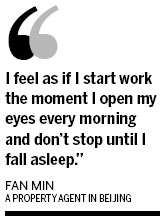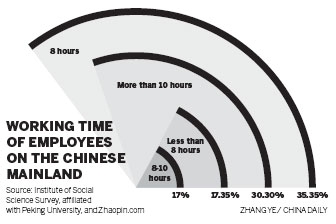All work, little play is the norm, poll finds
Updated: 2012-05-02 07:35
By He Dan (China Daily)
|
|||||||||||
Every three in 10 employees on the Chinese mainland work 10 hours or longer per workday, according to a new survey.
But even the average worker on the mainland toils eight hours and 40 minutes a day, concluded a survey of 30,000 residents in 28 cities who were asked about their work and life in the last three months. Nearly half of the respondents work longer than the eight-hour workday stipulated by Chinese labor law.
|
 |
The Institute of Social Science Survey, affiliated with Peking University, and Zhaopin.com, one of China's biggest employment agencies, jointly released the poll results in late April ahead of May Day, which fell on Tuesday.
About 66 percent of respondents said they had to work after they went home for about half an hour.
"I feel as if I start work the moment I open my eyes every morning and don't stop until I fall asleep," said Fan Min, 26, a property agent in Beijing.
Fan said his working hours are typically from 9 am to 9 pm, with an hour break for lunch at noon.
He worked on Tuesday, though it was May Day, within the three-day national holiday from April 29 to May 1.
"For people like us, working on weekends or holidays is so common, because most of our clients have time to look for apartments (to rent or buy) on non-workdays," he said, adding that his company pays him triple wages for overtime.
The poll did not offer data on how many of the people who work overtime receive their legally mandated extra pay.
Feng Nan, 27, who works for a public relations company in Beijing, said sometimes people feel that they have to work extra hours to impress their bosses.
|
 |
"Our supervisor admires the busy bees and is one himself, so how can I leave the office and go home if my supervisor is still at his desk," she said.
Feng Tongqing, a labor professor at the China Institute of Industrial Relations, said overworking is difficult to avoid in the service sector and manufacturing industry in developing economies such as China.
The phenomenon becomes worse when labor unions are too weak to fight for workers' rights, such as guaranteeing reasonable working hours and decent pay, he said on Tuesday.
Feng argued that the global economic downturn also forced Chinese workers to work harder than before.
"Many small or medium-sized companies have to fight more fiercely for their share of the domestic market. These companies' owners transfer the survival pressure to their employees, who have to sweat more to keep their jobs secure," he said.
Guangzhou, in South China's Guangdong province, could be called the most tiring of the 28 cities surveyed.
First, it had the longest average workday, at just over nine hours. But 12 other cities, including Hangzhou and Shanghai, followed Guangzhou on the list of cities where the average workday was longer than eight hours.
Second, it topped the list of cities where workers get the shortest night's sleep, at seven hours and 12 minutes.
Beijing respondents on average spend an hour and 20 minutes commuting to work and back. Workers in five other cities, including Shanghai, also spend more than an hour commuting on workdays.
The poll also found that workers spend less than an hour a week on sports or fitness.
Contact the writer at hedan@chinadaily.com.cn
Today's Top News
President Xi confident in recovery from quake
H7N9 update: 104 cases, 21 deaths
Telecom workers restore links
Coal mine blast kills 18 in Jilin
Intl scholarship puts China on the map
More bird flu patients discharged
Gold loses sheen, but still a safe bet
US 'turns blind eye to human rights'
Hot Topics
Lunar probe , China growth forecasts, Emission rules get tougher, China seen through 'colored lens', International board,
Editor's Picks

|

|

|

|

|

|





